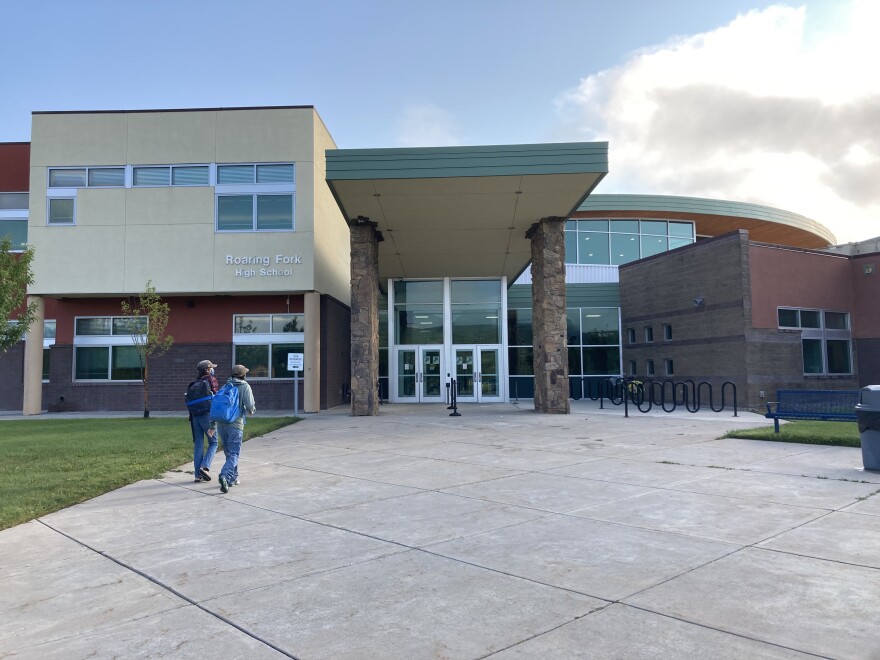The Roaring Fork School District (RFSD) is developing a plan to introduce drug-sniffing dogs on its campuses this semester, but some organizations are questioning the legal implications.
Based on internal disciplinary data, school district leaders say they’re concerned about drug activity on campus, and they’ve been holding forums this winter to discuss new drug prevention and safety strategies.
At a school safety forum in February, Paul Lazo, a school resource officer at Roaring Fork High School, said he tries to address these issues outside the juvenile justice system whenever possible.
“I'm not here to discipline young people,” Lazo said. “I'm here to try to identify why they chose to make the decisions they did, and try to find a resource to give them the solution.”
Lazo said he doesn’t take issue with drug-sniffing dogs and that they could be a deterrent to youth drug use, as long as they’re introduced in a controlled manner. However, he won’t be the one handling the animals. District staff say they’ll contract with a separate agency that will be on call when a school wants to use them.
While the Fourth Amendment protects students from unreasonable searches, when a school conducts a random sweep with drug dogs, it isn’t considered a search, so schools don’t need probable cause or a warrant to conduct them.
However, a senior policy strategist for the ACLU, Anaya Robinson, worries that Latine students could be unfairly or unintentionally targeted.
“When we think about metal detectors, that is effectively imposing the same safety consideration equally across all students,” Robinson said in an interview with Aspen Public Radio. “When we talk about drug sniffing dogs, there is potential for that to become more targeted.”
The school district and its law enforcement partners have seen conflicts in the past.
In 2011, the Glenwood Springs Post Independent reported that a few school resource officers were working on an anti-gang task force run by Immigration and Customs Enforcement, which concerned undocumented students and families about their safety at school.
Local police department leaders either weren’t there at the time or said they do not recall this, but RFSD still made moves to address the issue.
They passed a memorandum of understanding encouraging its law enforcement partners to exercise extraordinary discretion when assigning school resource officers with “outside duties” where a student’s family immigration status may come into question. On Feb. 27, interim superintendent Dr. Anna Cole said district officials are developing the new program with history in mind.
“We want to be really thoughtful of ‘how do we do that in a way that’s conscious of what happened in the past, that’s conscious of the needs of our community now, that we’re not retraumatizing kids and families and that we’re really leading ahead with their social-emotional well-being?’” Dr. Cole said.
Program Logistics
RFSD officials are still ironing out details of their plan, but Dr. Cole said when the program launches, school leaders will have the authority to call in outside canine units at their discretion.
While the kids are in class, the school would go into a “secure” mode where students are kept in classrooms and cannot roam the hallways. The dogs would then sweep the building, and school leaders could identify a few classrooms to search.
At that point, the canines would go into those classrooms and alert their handlers if they smelled narcotics.
Lindsay Brown is an attorney who specializes in student discipline defense, and she sees potential for legal vulnerability under the 14th amendment, which guarantees equal protection under the law.
“We're also talking about this not being so much randomized as it is targeted,” Brown said in a phone call. “And if, in fact, that pattern in practice does target students of color or special needs students or any other protected class, then I think the school district has some exposure there. I'm not sure that that would be found to be constitutional.”
If handlers bring the canines to patrol every classroom, Robinson said that could be considered equal enforcement. If it’s random, and the students in the classrooms are majority Latino, he said “there’s just a lot of potential for interpretation of bias, even in situations where it might not intentionally exist.”
Jonathan Landon, RFSD’s public information officer and chief of staff, said they ensure non-discriminatory practices in all actions the district takes.
Dr. Cole emphasized that her biggest goal is for the canines to deter students from dealing drugs on campus. In addition, she wants to identify which students need support with drug use and addiction.
But some studies show drug dogs can often get it wrong. One investigation from the Chicago Tribune found that over half the time in Illinois, dogs were alerting officers to items that turned up negative for drugs.
Robinson said school districts could also run into legal issues since dogs can be unpredictable.
“There have been instances, historically, where drug sniffing dogs have gotten off of their leashes and chased children around classrooms,” Robinson said.
The ACLU has challenged school districts or threatened legal action in court multiple times over using drug dogs. Despite the risks, schools across Colorado and the nation still use them as a drug prevention tool.
RFSD Efforts
RFSD is taking steps to be a more welcoming, equitable place.
The school board recently agreed to do an equity audit and gave initial approval to a new safe haven policy.
School Resource Officer Lazo, who’s an immigrant from South America, has also made it his mission to support kids with similar backgrounds.
“Not having a legal status, I often feared the police,” Lazo said. “You know, one of my big goals in becoming a police officer … was to be an advocate and an educator for people who may share that fear in that same experience.”
RFSD officials are still developing the program, and expect schools will begin conversations with families once it’s finalized.



